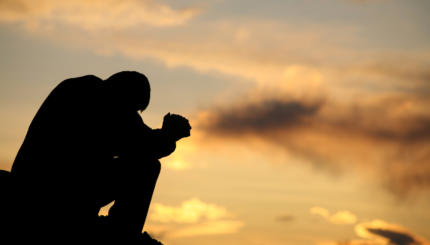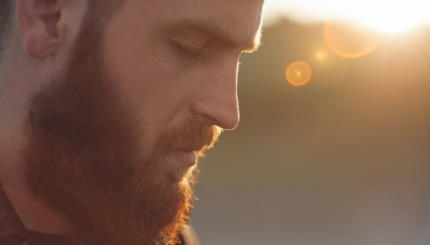I have distinct memories of being in synagogue services as a child and trying to mimic everyone around me when we arrived at the moment of Kedushah. I followed my mother’s instructions. Stand still and tall with your legs together. Bow left, right, and center. Go up on your toes.
Before I even knew the words, I knew the motions.
The Kedushah is a full-body experience, and its nearly aerobic choreography is unparalleled anywhere else in the service. This is perhaps intentional, because the Kedushah offers an unparalleled experience. While the rest of our prayers give us words for reflecting on our relationship with God as a community and as individuals, the Kedushah is different.
Recited in the midst of the Amidah prayer, which acknowledges our relationship with the God who performs wonders for us and supports us in our needs, the Kedushah seems a bit of an outlier. That is because during the Kedushah we are not human beings; for a brief moment in time, we pretend we are angels.

Help us keep Jewish knowledge accessible to millions of people around the world.
Your donation to My Jewish Learning fuels endless journeys of Jewish discovery. With your help, My Jewish Learning can continue to provide nonstop opportunities for learning, connection and growth.
Though the text varies slightly depending on the service, the Kedushah always invokes the angels, and is punctuated by biblical verses that tell of the words of praise spoken by these heavenly beings.
It begins by mimicking the angelic call to readiness, referencing the prophet Isaiah’s vision of God. In it, he describes angels (called seraphs) attending to God who is sitting on a magnificent throne: vekara zeh el zeh v’amar (“each one called out to the other and said”) Isaiah 6:1-2. In that moment — bowing first to the left, then to the right, then straight ahead — we too are seeking one another out, making sure we’re all on the same page and ready for this sacred task and this sacred moment.
Once we have done so, we rise up, reaching toward the heavenly realm, propelling ourselves upward on our toes as we recite: Kadosh, kadosh, kadosh. Holy, holy, holy is the Lord of Hosts, whose glory fills the entirety of the earth. Isaiah 6:3
In this moment, singing in angelic unison, we are meant to be part of something greater than ourselves. We are meant to be part of something that even the most creative human minds could not imagine.
Truthfully, though, I find the experience a bit unnatural. We aren’t angels. The stance we take for the Kedushah — legs together to mimic the angels whom tradition teaches stand on one fused leg — is not a comfortable one, but rather one which requires focus to stay balanced. And perhaps that’s the point. We stand at attention, challenging ourselves to reach toward a realm that is inaccessible to us in order to remember who and what we truly are.
Eventually, gravity has to take over. We come back down on our heels, we separate our feet and find our balance. We return to our human form. I’m reminded in this moment of my fallibility, and my need to be tethered to the earth. I’m not an angel, nor should I be. I have a job to do here.
Rabbi Adin Steinsaltz writes, “If God had wanted man to become an angel and to do everything as such, He would simply have created more angels. But His wish was to create man.”
Even as we take a moment to behave like the angels, as we do all that we can to leap up and off this earth into the divine realm, we are pulled back down to earth where we belong. As the Kedushah prompts us to reach toward the divine, our job is to embody godliness on earth through our actions and relationships. While the Kedushah is perhaps the most sacred moment of the service, I find that its true power comes when we land back on our heels, separate our feet, and realize what a gift it is to be human.
Rabbi Ariella Rosen is the director of admissions for the cantorial and rabbinical schools of the Jewish Theological Seminary.



